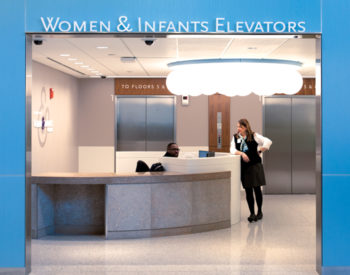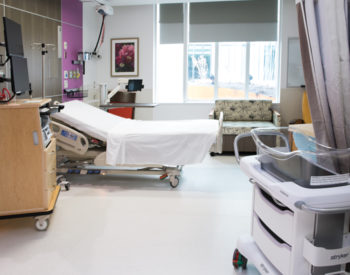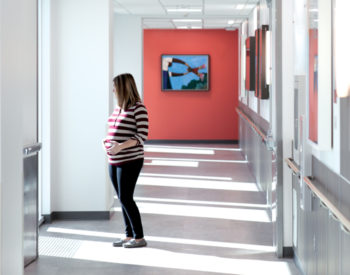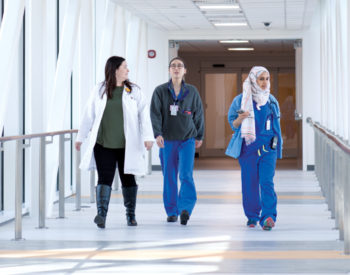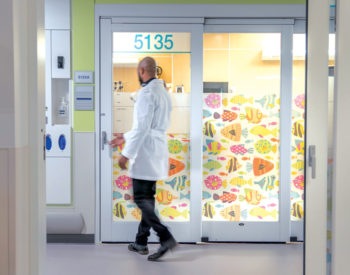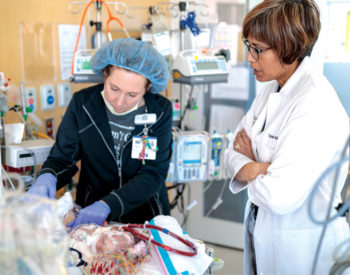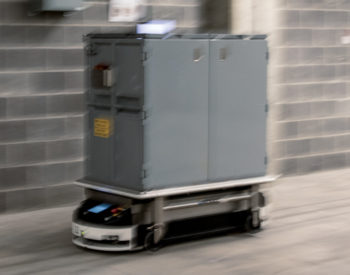
Holly and Ben Allen welcome their new baby, Max, in the Women & Infants Center.
A new center on the Washington University Medical Campus is transforming health care for women and babies in the region. The Women & Infants Center is housed within two 12-story inpatient towers recently built by BJC HealthCare: the Barnes-Jewish Parkview Tower and a St. Louis Children’s Hospital tower. A skywalk connects the labor and delivery areas in the Parkview Tower with an expanded Level IV newborn intensive care unit (NICU) in Children’s Hospital, drastically reducing the time it takes to transfer critically ill newborns.
The center combines the most advanced facilities — allowing specialists to perform surgeries in the womb or manage risky deliveries — with beautiful, restful, comfortable spaces for patients.
“Women and infants remain at the center’s heart. It’s as good as it gets,” said George Macones, MD, head of the Department of Obstetrics and Gynecology.
Other tower floors significantly enhance and expand inpatient cancer care and pediatric care. The improvements stem from a three-year design planning process involving input from nearly 800 health-care workers, patients and family members.
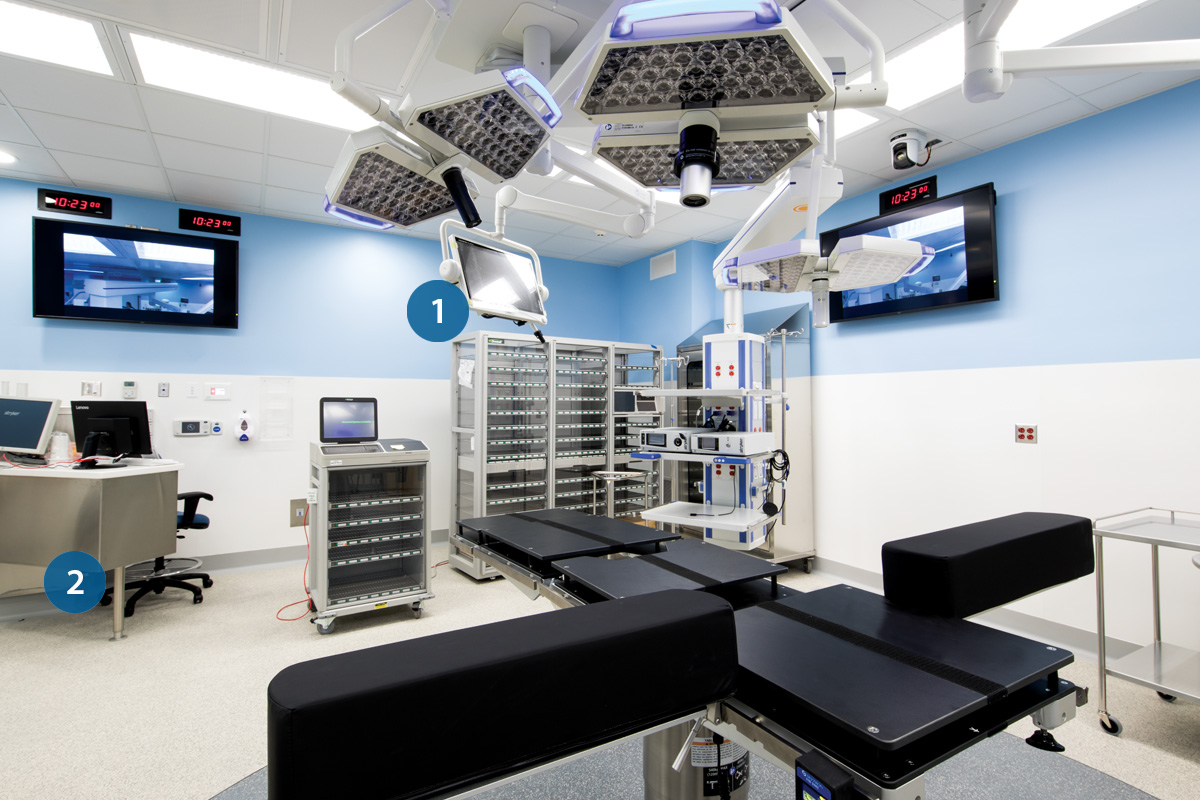
The three new operating rooms bring together advanced technology, medical efficiencies and a focus on patients. 1. Cameras are positioned over bassinets in the OR and areas where medical staff attend to newborns. The cameras let mothers watch their new babies even when they’re not holding them. This is especially helpful for C-sections or multiple births. 2. As many as 40 medical professionals can work in the largest operating room, which is designed for emergencies, for complex operations such as in-utero surgeries or for multiple births.
Caring for mom
Mothers-to-be who deliver at the Women & Infants Center do so in an environment equipped with the top medical expertise and technology to treat serious conditions that may affect a pregnant woman or fetus. Barnes-Jewish Hospital annually cares for about 700 women from eight states who need specialized obstetric care for deliveries involving multiple births, pregnancy complications, fetal abnormalities and congenital defects in utero.
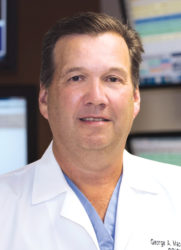
The labor and delivery floor has three operating rooms, including one for maternal-fetal surgeries that is state-of-the-art and spacious enough to accommodate up to 40 health-care workers. “This is the room where we do procedures on a fetus while still in the womb,” said George Macones, MD, the Mitchell and Elaine Yanow Professor and head of the Department of Obstetrics and Gynecology. “Having extra space is critical. One procedure, for instance, may include physicians and nurses from obstetrics, fetal medicine and anesthesia.”
Altogether, 3,300 babies were born last year at Barnes-Jewish Hospital. The center offers 52 private obstetric rooms, in addition to 18 labor and delivery rooms. The rooms have sleeper couches for family, ample outlets for charging electronics and built-in storage stocked with supplies for diapering and feeding. Android tablets installed on over-the-bed tables make it easy for the patient to contact the doctor, order food and access the internet.
The center’s care extends to all women with the new, 12-bed Women’s Assessment Center, which allows OB-GYN patients to bypass the general emergency room to receive treatment for ovarian cysts, hysterectomies and other conditions.
“We take care of women in all reproductive phases,” Macones said. “It’s one stop for women’s health.”
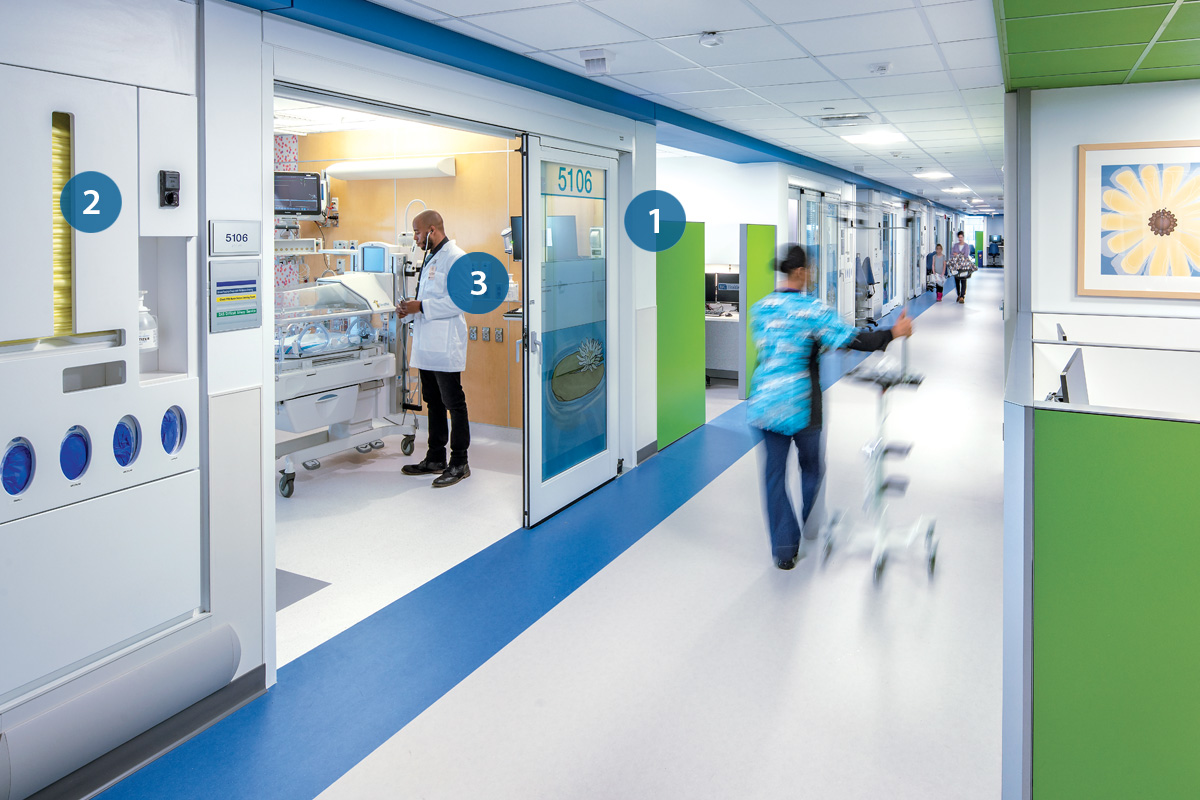
The NICU will hold 150 beds when the expansion is complete. The design was informed by the latest neonatal care research, including studies on the importance of avoiding loud noises. Private rooms cut down on infection. 1. With in-room charting, nurses and doctors don’t have to trundle around a computer on a cart to record a patient’s progress. Each room has its own computer, which folds into the wall like a Murphy bed. 2. Cabinets designed to hold personal protective equipment (PPE), such as gloves and gowns, are in consistent locations and require refills once daily, minimizing noise and traffic. 3. Caregivers wear badges that show their real-time location and record when they enter and leave rooms. When immediate assistance is needed, they can press the badge to send an emergency alert. In rooms with TVs, the badges trigger a display of the name, title and photo of doctors and nurses to help patients know who’s who.
Best for baby
Seconds count when treating a critically ill newborn. Before the center opened, health-care workers transporting an infant had to walk one-fourth of a mile from labor and delivery to the NICU. Now, physicians, nurses and family members have immediate access to the baby, thanks to the 110-foot skywalk connecting the two hospitals.

“We can’t afford to waste any time after the mother gives birth,” said F. Sessions Cole, MD, the Park J. White, MD, Professor of Pediatrics, executive vice chair of pediatrics and chief medical officer at St. Louis Children’s Hospital. “The skywalk allows us to treat babies immediately so we can provide the best care possible.”
The expanded NICU offers 37 private rooms, two of which accommodate multiples, bringing the total number of NICU beds to 125. The short skywalk jaunt from the postpartum rooms also promotes mother-baby bonding. “We include the mom as part of the infant’s health therapy,” said Cole, director of the Division of Newborn Medicine in the Department of Pediatrics. “Babies whose moms hold and talk to them often experience better health outcomes. For example, babies born with opioids in their system may experience less irritability and physical discomfort when moms hold them.”
Intertwining mom in a baby’s health-care plan also means encouraging self-care, a feat made easier because medical appointments for postpartum mothers are in the center. “This eliminates obstacles to health care such as transportation,” Cole said. “Many moms put all their energy toward their babies and neglect themselves. But a well-cared for mom makes for a happier baby.”
The expansion also adds 96 private patient rooms on six pediatric floors, addressing the need for more beds.
Published in the Summer 2018 issue



